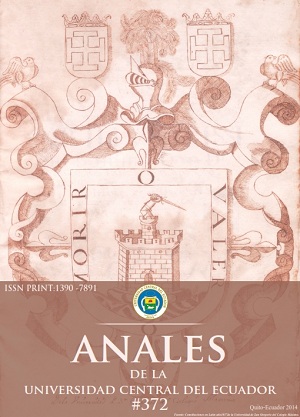La comunidad antagónica: Walter Benjamín y Carl Schmitt en su aproximación al romanticismo alemán
DOI:
https://doi.org/10.29166/anales.v1i372.1296Keywords:
Romanticism, French revolution, Bolchevist revolution, emancipation, ConservatismAbstract
The polemical-intellectual relationship between the work of Walter Benjamin and Carl Schmitt as paradigmatic german thinkers at the beginning of the past century has been an issue particulary contested by both philosophical and political approaches in spite of their radical different paths. Common themes like political theology and the theory of sovereignity, the revolutionary messianism and counterrevolutionary conservatism have been highly debated and passionated thematized. However, their initial encounter with the so called Romantic School in the early eighteenth century which was materialized in two seminal works The concept of critique in the German Romanticism in one side, and Political Romanticism at the other has scarcely received attention in the academic literature. The aim of this article is to contextualize these common approach and attempt to assess the significance and divergence of these common works within their intellectual production and existential trajectories in their historical epoch.
References
• Hans BLumenberg, La legibilidad del Mundo, Paidos, Buenos Aires, 2003.
• Phillipe Lacoue-Labarthe y Jean Luc Nancy, L’absolu Litteraire –Théorie de la Littérature du Romantisme Allemand, Seuil, 1978.
• Ayrault T.I p.168 La génese du romantisme allemand Aubier 1961
• Ayrault p.169
• Jean Luc Nancy –Philippe Lacoue Labarthe, L’absolu Littéraire, p. 420.
• Jacques Ranciére, La parole muette, essais sur les contradictions de la littératur, chapitre 3.
• La tetralogía de Döblin sobre el período del nacimiento de la República de Weimar constituye el testimonio literario más estremecedor de dicha época: 1918: Un pueblo traicionado; por su parte, la reflexión filosófica alemana casi como en ninguna ocasión se ocupó del Zeitgeist salvo en Odo Marquard Adios a los Principios (2005.)
• Ayrault, R (1961) La génese du Romantisme Allemand Benjamin, Walter
(1994) Correspondence Chicago University Press 1994
(1998) Gesammelte Schriften III Kritiken und Rezensionen Suhrkamp Verlag 1991
(1998a) Gesammelte Schriften VII Vermischte Notizen Suhrkamp Verlag 1991
(2003) El concepto de crítica en el Romanticismo Alemán Abada Editores
• Blanchot, Maurice (1995) La Conversación Infinita Monte Ávila, Caracas
• Blumenberg, Hans (2005) La legitimidad de la Modernidad Editorial Pretextos
• Döblin, Alfred (2010) 1918: Un pueblo Traicionado Edhasa
• Lacoue-Labarthe, Philippe & Nancy, Jean Luc (1987) L’absolu Littéraire - Théorie de la Littérature du Romantisme Allemand Editions du Seuil
• Marquard, Odo (2005) Adios a los Principios Ediciones Alfons El Magnanim
• Mehrig, Reinhard (2003) Carl Schmitt
• Novalis (1980) La Enciclopedia (2002) Semillas
• Ranciére, Jacques (1998) La parole muette- Essai sur les contradictions de la Littérature Hachette
• Schmitt, Carl (2001) Romanticismo Político Universidad de Quilmes


